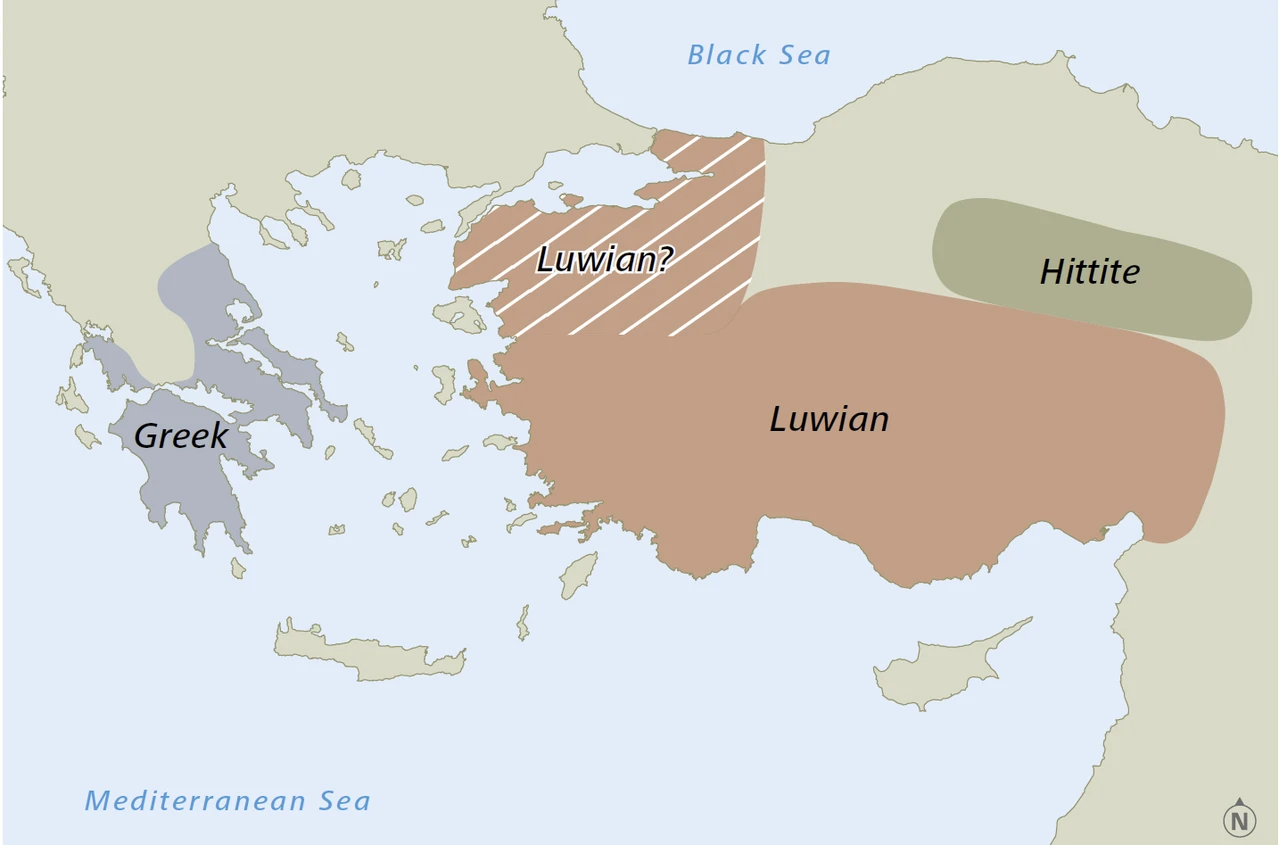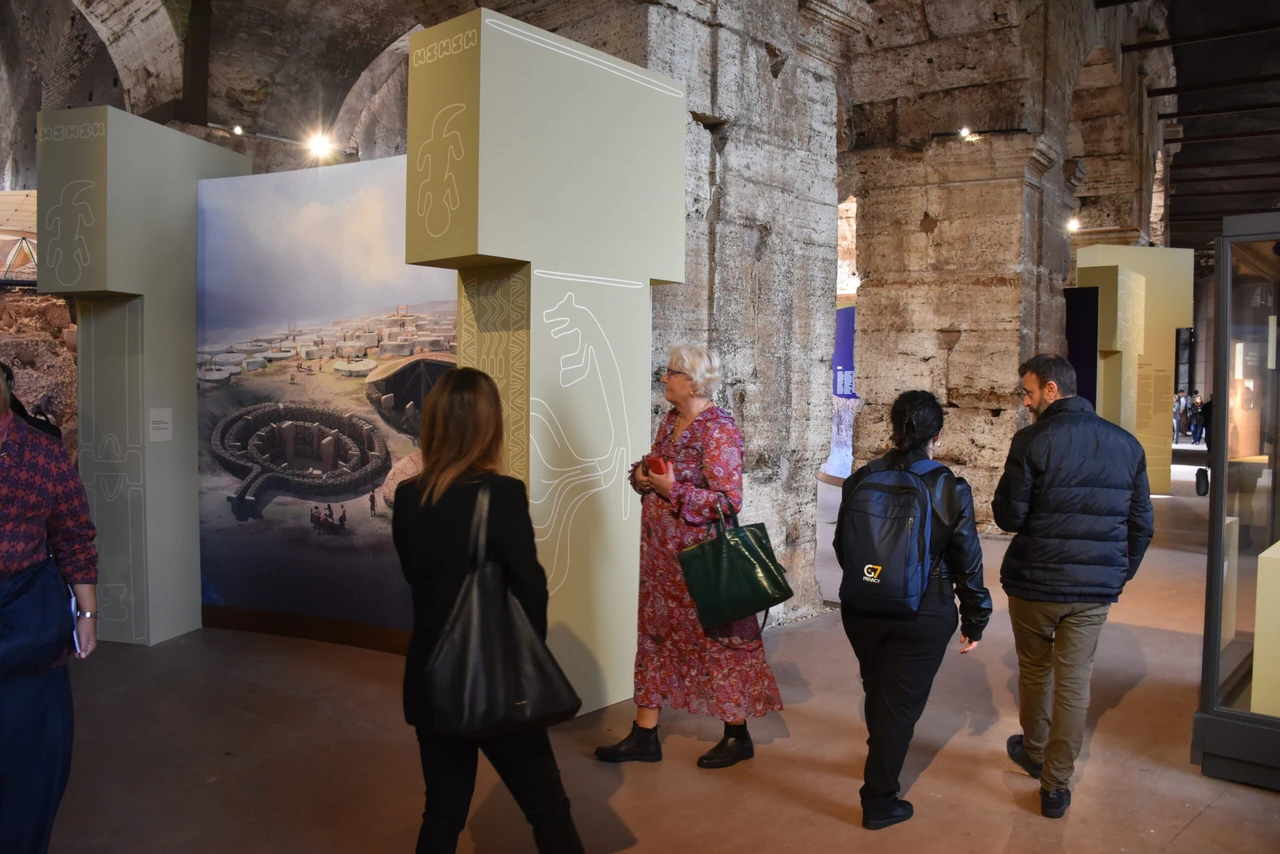Luwians of Türkiye: Swiss geoarchaeologist unlocks untold chapter of ancient history
 The region where Luwian was spoken at the end of the Bronze Age was much larger than the one where Hittite was spoken. (Brill's New Pauly, 2012).
The region where Luwian was spoken at the end of the Bronze Age was much larger than the one where Hittite was spoken. (Brill's New Pauly, 2012).
For centuries, the Luwian culture has remained hidden, but new studies are now bringing this crucial piece of the Anatolian puzzle to light.
These revelations are reshaping our understanding of Türkiye’s Bronze Age and highlighting the influence of the Luwians on the ancient world, including key historical events such as the Trojan War and the fall of the Hittite Empire.
Luwians: Missing link in Eastern Mediterranean history
Eberhard Zangger, a Swiss geoarchaeologist and head of the Luwian Studies Foundation, explained the pivotal role the Luwian culture played in the Eastern Mediterranean. “If we examine a map of known cultures around 1200 B.C., we notice a significant gap in the western part of Türkiye,” he told the Anadolu Agency (AA).
“The Mycenaean civilization barely touched Anatolia, while the Hittites focused on central Asia Minor. This rich region, however, was key to the historical landscape,” Zangger said.
Without accounting for the Luwians, critical questions about the Trojan War and the downfall of the Hittites remain unresolved.
Luwian Studies Foundation is helping piece together evidence of a thriving Bronze Age culture that spanned hundreds of settlements across Türkiye during the time of the Trojan War.
“We have identified 483 large settlements, many of which were inhabited for up to 5,000 years,” Zangger added.
Urgent need to preserve Türkiye’s ancient sites
While many of these Luwian sites remain largely unexplored, they are under constant threat from agriculture, construction and exposure. Zangger emphasized the importance of finding more royal centers beyond the famed city of Troy.
“Western Asia Minor had numerous small kingdoms, yet Troy remains the only royal site we know,” he said.
He believed that discovering additional royal centers, potentially with archives, could revolutionize our understanding of Türkiye’s rich ancient history and captivate global attention.
Challenging Western-centric archaeological narrative
Zangger also highlighted the deep-seated biases in Western archaeology, particularly the influence of philhellenism—an 18th and 19th-century movement that revered Greek culture. “Much of early European archaeology was aimed at legitimizing European dominance and reinforcing the idea of Western superiority over the Ottoman Empire,” he said.
These outdated perspectives have shaped much of the archaeological discourse, even though they have been largely discredited. Zangger’s work on Luwian culture represents a fresh, science-driven approach that challenges these colonial biases and allows for a more accurate understanding of ancient history.
Türkiye’s archaeological riches: Treasure trove yet to be fully explored
Zangger believes Türkiye’s archaeological heritage holds “endless possibilities” for groundbreaking discoveries, particularly concerning Bronze Age Anatolia.
“Most excavations have focused on Greek and Roman sites, leaving the Bronze Age largely unexplored,” he noted.
Despite limited exploration, Zangger is optimistic about future discoveries that could reshape our knowledge of the ancient world. “Many significant finds are still waiting to be uncovered,” he said.
Technological advancements could revolutionize archaeological research
To further investigate the Luwian culture, Zangger believes modern technology, including aerial surveys with drones and helicopters, holds the key. “If we get the necessary permits, these techniques could lead to groundbreaking discoveries,” he said.
For example, aerial scans of the Plain of Troy could reveal the full extent of the ancient city. Similarly, creating a detailed photogrammetric model of the Yazilikaya rock sanctuary could allow researchers to align it with astronomical data to better understand its historical significance.
“By leveraging advanced technology, we can uncover the rich cultural history of Türkiye, expanding our knowledge far beyond the well-known Greco-Roman sites,” Zangger concluded.
The Luwian culture, once overlooked, is now recognized as a critical element in understanding the ancient history of Türkiye and the broader Eastern Mediterranean.
With groundbreaking research led by experts like Eberhard Zangger, the Luwian Studies Foundation is uncovering a fascinating chapter of Türkiye’s Bronze Age, reshaping our comprehension of pivotal historical events, such as the Trojan War and the fall of the Hittite Empire.
The untapped archaeological potential in Türkiye promises to unlock more secrets of ancient civilizations, particularly from the Bronze Age.
By combining modern technology with a renewed focus on previously ignored cultures, researchers hope to preserve and reveal a wealth of untold stories.
As global attention turns toward Türkiye’s rich heritage, the Luwians stand as a testament to the endless possibilities waiting to be explored in this historically rich region.



